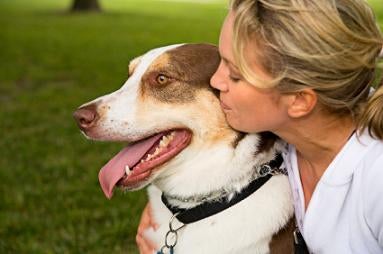Dog Allergies
How to Diagnose and Treat your Dog's Allergies
If you have ever been allergic to anything, you know how difficult it can be to deal with. Our dogs can similarly be afflicted by a variety of allergies. Dogs can get allergic reactions to a variety of environmental substances. Usually, if a dog scratches and fidgets habitually, it will become more prone to developing an allergic reaction.

Much like humans, dogs experience contact allergies, food allergies and environmental allergies. The symptoms of these allergies are also varied and depend completely on the type of allergy that the dog is suffering from. The symptoms of allergy in your dog can range from mildly unpleasant to extremely unpleasant. Depending on the substances involved, the dog may also have a grave and life threatening reaction - it can be that serious.
It is natural to be concerned if your pet is suffering from an allergic condition. Since a dog is dependant on its owner completely, it often falls on the pet owner to get the best medical help for the dog. Most people rush to their veterinarian as soon as they realize that there is something amiss with their pet. However, there are also those who are unable to observe the signs of distress in a puppy or older dog.
Allergies in dogs are a common ailment. Since allergens can be found in the environment as well as most public places, dogs can easily be exposed to them.
Common Causes of Dog Allergies
There are many different types of allergies in dogs and each one is caused by different agents. Here are the different kinds of allergies that dogs may suffer from:Contact Allergies
In dogs, contact allergies are the least common type. The reaction in this type of allergy is formed on the skin and is localized. Dogs may develop this kind of allergy due to the type of materials used in the dog's bedding, flea collars or other close contact with allergenic substances.
Dog Flea Allergy
This is one of the most common types of allergies in dogs. In response to flea bites, dogs usually experience only mild allergic symptoms. Often, there may be no itching due to flea allergies, apart from minor irritations. The reaction is usually caused due to the flea saliva that is deposited on the skin of the dog when the flea begins to bite it. However, persistent flea allergies can cause dogs to scratch and bite at their skin a lot, increasing the chance of secondary infections caused by bacteria and viruses entering through the broken skin.
Bacterial Allergies
These kind of pathogenic allergies are usually caused by the different types of staphylococci bacteria. Generally, the staphylococci bacteria are all around us, however if the dog is healthy and has a high immunity, the bacteria do not affect him/her. It is only when the immunity of the dog is low that the dog experiences allergies from this bacteria.
Food Allergies in Dogs
Like humans, dogs can also consume substances that cause allergies in their body. Food allergies, though not very common in dogs, may be extremely dangerous and even fatal for dogs. It is important to understand which substances a dog is allergic to, in order to keep a check on the diet of the dog. Your dog's diet plays a crucial role in not only preventing dog allergies but also your dog's overall health, wellbeing and longevity.
Inhalant Allergy
Atopy or inhalant allergy is the most common type of allergy in dogs. Usually dogs are allergic to all the inhalants that cause allergies in humans like pollen, mildew, dust mites, ragweed and chemical inhalants. The symptoms caused due to each of the inhalant may be different.
Dog Allergies - The Symptoms
The symptoms of allergy are different for each different cause. The most common symptoms of allergies in dogs are itching and formation of lesions on the skin. Usually when a dog is experiencing an allergy, it scratches itself a lot and may also break the skin, creating an open wound.When a dog experiences contact dermatitis or contact allergy, the lesions and the allergic reactions are localized on certain places on the skin. If the allergic reaction is severe, there may be loss of fur in patches and the skin may become reddened. Allergies caused due to chemicals and flea bites can also have similar symptoms.
Food allergies are extremely severe and may cause inflammation of skin, nausea, vomiting, unconsciousness and even death. Dogs that have a food allergy may not even have any observable symptoms until their condition begins to take a turn for the worse.
Inhalant allergies may cause sneezing, runny nose and watery eyes - symptoms which are similar to those experienced by humans in similar circumstances.

Dog Allergy Treatment
There are three basic approaches to the treatment of dog allergies. An anti inflammatory treatment is usually used in case the dog has severe contact dermatitis. The treatment involves the use of steroids and corticosteroids. Your vet may decide to give steroids through oral doses, injections or ointments, depending on the kind of symptoms a dog is showing. The vet may also decide to skip the steroids completely and rely only on the antihistamines, which may be useful in treating the condition of the dog to a large extent.Some veterinary doctors also give fatty acids supplements along with steroids and anti histamines. However, this kind of a treatment is non specific and may only treat the symptoms of the allergy, without treating the allergy itself.
In the case of contact allergy, if the allergen is removed from the proximity of the dog, the allergy usually disappears. Similarly, with bacterial and flea allergies, dogs can be given topical treatments and medicated baths to get rid of the pests and the pathogens. There are a lot of dogs which are benefited by bathing frequently with a medicated shampoo. Since most allergens are absorbed into the body through the skin, it is best to make sure that the dog is as clean as possible.
Allergy shots, also known as hypo sensitization, are also a popular way of treating allergies these days. To treat specific allergic reactions, small amounts of antigens can be injected into the body of a dog, thus reprogramming the immune system of the dog's body. However, in order for this treatment to be even mildly successful, it is first important to identify the specific allergens to which your dog reacts.
Itching may completely resolve in most dogs, after being given the hypo sensitization therapy for a few days. For other dogs, this may be a lengthier process and proper follow up and persistence may be required. However, this kind of treatment is not successful with food allergies and allergies in which the cause has not yet been identified.
Hypo sensitization is an effective method of treating allergies. However, it may not always be the best method of treatment, since there is considerable amount of cost involved. Some dogs may require this treatment for many months or years, making this treatment burdensome for the pet owner. The age of the dog is also a crucial factor in determining whether this is the best way to deal with the allergy of the dog. As dogs grow older, they get more allergies and therefore dogs may be retested every 2-3 years, as they grow older.
The success rate of the hypo sensitization treatment is not always great, since only about 50% of the dogs respond to the treatment well. Of the rest, 25% show no change in their symptoms while 25% show a partial improvement. The time of response of the hypo sensitization treatment is also varied. It may take 2-5 months for an average dog to respond to the treatment. However, there are some dogs which may require the treatment for about a year before they show even the slightest improvement.
For food allergies, the most important thing is to identify the allergen first. This can be an extremely tedious task. For about 8-12 weeks, a dog is subjected to elimination diet trials in which the dog is fed different food materials, some of which may cause allergic reactions as well. The purpose of this elimination diet trial is to create a hypoallergenic diet which does not consist of any single ingredient which could cause an allergic reaction to the dog.
Dog Allergy Summary
Dogs are not born allergic to substances. Allergies are conditions which develop over a period of time. Unlike humans, who may be born with food intolerance or food allergies, dogs develop their food allergies as they grow older.In order to treat any kind of allergy, it is important to first identify the real cause of it. Since the symptoms of various allergies are also similar, testing for various different allergies can help veterinary doctors understand the cause of such conditions. Once the cause of the allergy is identified, the veterinarian can finally make an informed diagnosis and use a treatment method best suited to your individual dog.
Though there are various treatments available for dog allergies, these are chosen on the basis of cost, age and the time of response. Different dogs respond to treatments differently. Some dogs may be given a combination of treatments in order to improve their condition.
Please consult the services of a Professional Dog Trainer, Behaviorist or Veterinarian before implementing any of the advice contained on this site.











 Your Privacy Choices
Your Privacy Choices